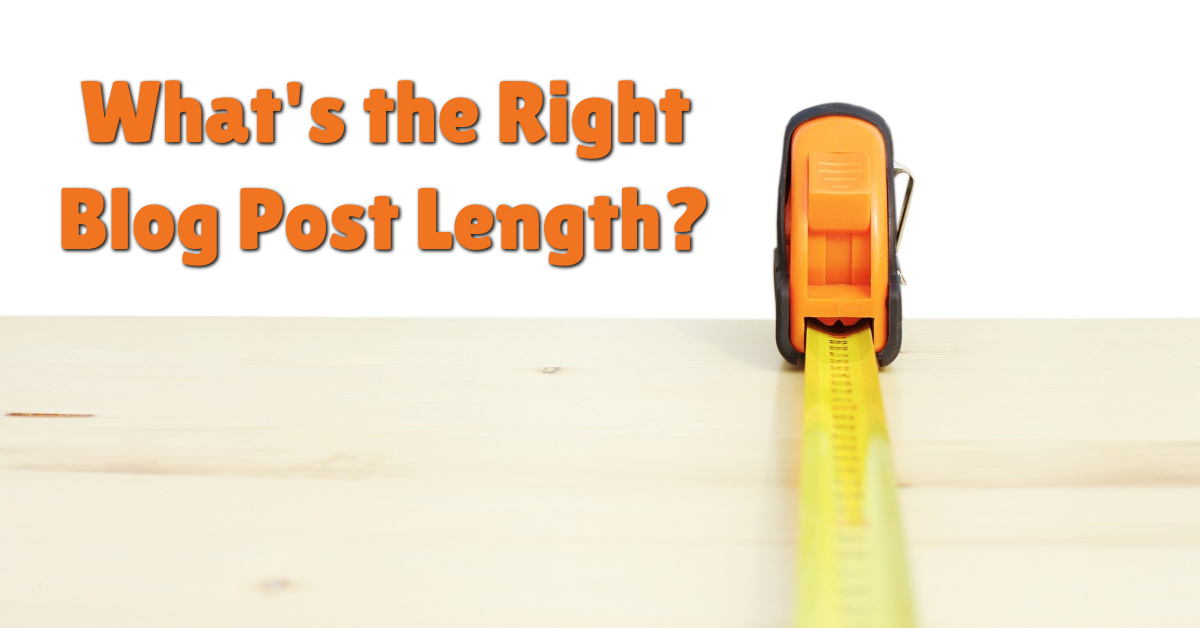
Why does blog post length matter? It matters for SEO, of course (search engines seem to prefer longer posts). But it also matters when it comes to readability. There are a lot of gurus who claim to have the answer about how long a blog post should be. But, the truth is, there is no real tried and true answer. There are good reasons for having long, short and in-between blog posts, so the best answer to this question is likely to have a combination of all types of posts.
This question comes up a lot, especially when I'm teaching on the subject of content marketing, because so many of my students and clients are fixated on getting things ‘right.' But the fact is, there is no single ‘right' length when it comes to blog posts.
Lots of online marketing experts claim to have the answer about how long a blog post should be. But, the truth is, there are good reasons for having long posts, short posts, and everything in-between. Let's take a look at how to best utilize each of these posts types:

Short Blog Posts
People have pretty short attention spans these days, and keeping blog posts short is great way to keep your readers coming back for your convenient, easy-to-consume posts. Bite-sized content is great to read while waiting in line, at the doctor's office, or when your reader has a short break. You get to the point quickly, so they can move on to your call to action.
Types of short posts:
Curated
You collect the content you think is relevant that your audience should look at, and write a short blurb or intro to the content.
Product Announcements
These don't always need a long post. You may just say that the product is ready or that it's a good product, and link to where they can buy it which is often a longer sales page.
There are lots of bloggers who have proven to be very successful with this type of blogging. A real proponent of short blog posts that get right to the point is Seth Godin and no one can deny his success.

Medium-Length Blog Post
This is still a pretty typical length for many bloggers. Writing blog posts between 450 to 700 words is reasonably easy to achieve and has long been a standard recommended length because it's possible to become too long-winded and perhaps off-topic if you go longer. That may be true in some cases. Confining your writing to a certain word count can help you stay focused.
Types of medium blog posts:
The ‘How To' Post
This type of blog explains how to do something that is very singular. Sometimes it uses images to get the point across.
The Informational Post
Sharing information with your readers is often done in the medium-length blog post. It's a good length to transmit information without going overboard.
Most blog posts fall into this category. And there's nothing wrong with that. These posts are the perfect length to tell a story, share information, and include a call to action – while including enough keywords without overwhelming the readers. HubSpot is a huge proponent of the medium-length blog post. Many people only use medium-length blog posts to great success.

Long Blog Posts
Another type of blog posts that ‘experts' swear by is the ‘long-form' blog post. This is a blog post that is more than 800 words long. These types of blog posts are often seen as more authoritative and the fact is, they are excellent for SEO. Google respects authority pages more than niche blogs with thousands of short pages of content. Therefore, creating some longer posts, even up to 3500 words, can be great for your audience and search engines.
Types of long posts:
Case Studies
These by definition need to be long because you're telling a story about something that is more in-depth. Case studies that are too short will not tell the whole story. People love knowing as much as they can about other people's lives and stories.
Annual Reports
If you have a large enough business that you can create an annual report, posting it for reading on your blog is an excellent way to put content that will interest your readers. They definitely want to know how you're doing.
Neil Patel, the founder of KISSmetrics, is a lover of long form blog posts and it works for him and many other bloggers. However, it's important to stay on topic, not deviate and change subjects, and be able to actually write well enough to keep the interest of the reader.
Related Post: The Perfect Length For A Blog Post
No matter what the length of your post, it needs to have a reason to exist. Maybe it's there to presell your reader on a product or service you have to offer or maybe it's there to help build your email list. Whatever reason, make sure you take the time to think strategically about who your audience is and how they are most likely to engage with your blog.
